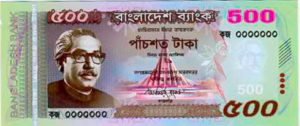Dhaka Times Report. It is not a new thing that big money like 500 or 1000 rupee notes start being faked. But recently, with the release of new money, its nets have started coming out. Especially, the recently released notes of 1000 and 500 rupees are known to be more fake. And a syndicate of the country is involved with these fake notes. It has been alleged that this syndicate has expanded so much that not only the outside, but the very powerful syndicate has come under the grip of the country's 'new currency printing' program. The syndicate is printing low quality notes one after another. Low quality paper is being used. It has less amount of yarn than required. More polymers. Apart from this, cellular fiber is being used outside the tender conditions. And what is worrying is that the 'security print' that ensures the security of notes is a technology of about 40 years ago. Due to which these notes are easily faked. As a result, the country's economy is being damaged on the one hand. On the other hand, the government and general public are being cheated financially. Because ordinary people now do not understand which is fake and which is real! Due to which common people are losing trust in the government. Even the banks themselves are writing the customer's account number on the bundle while taking new notes!
And what is worrying is that the 'security print' that ensures the security of notes is a technology of about 40 years ago. Due to which these notes are easily faked. As a result, the country's economy is being damaged on the one hand. On the other hand, the government and general public are being cheated financially. Because ordinary people now do not understand which is fake and which is real! Due to which common people are losing trust in the government. Even the banks themselves are writing the customer's account number on the bundle while taking new notes!
A related source claimed that Bangladesh Bank (BB), Ministry of Finance, Security Printing Press and a class of contractors are involved in this weak note printing syndicate. Rules are not being followed in the tender process for procurement of money printing paper. Various unethical conditions are being imposed to give work to the designated institutions. Restricting open competition. This sensational information was found while investigating the spread of fake notes in the market.
Analysts feel that it is unfortunate if there is any irregularity in the process of printing money. The government should investigate and take quick action in this regard. However, the officials of Bangladesh Bank and Security Printing Press are denying these allegations.
Recently, Bangladesh Bank released new notes in the market. These new notes that have recently come into the market include 1000, 500, 100, 5 and 2 taka. All these notes have Bangabandhu's photo. The first three notes look almost the same color. And each one has the same security thread (holographic feature) and watermark. Those concerned said that when the new notes first came to the market on August 11 last year, fake notes were caught from different parts of the country within 4/5 days. Then one by one so many fake notes were caught that the new notes of Bangladesh Bank created a lot of panic in the public mind. There have also been cases in different parts of the country that after shopping, no one wants to take a new note except the very familiar people. And even if the note is given from an acquaintance, many have written the name of the person concerned on it, so that the bearer can be caught later if the note is fake. Even the banks are writing the customer's account number on the bundle while withdrawing money.
In this regard, while investigating the background of the recovery of fake notes of billions of rupees, various sensational information is known. The paper and security thread of the new notes introduced in the market are very old technology. 'Watermark' is very old. Experts say that the security thread used in the new notes is called 'Holographics Feature', invented by British thinker Dennis Gaber in 1971. For this he won the Nobel Prize that year. Since then, this technology is being used in different countries of the world, first in currency and then in various products. However, when used as a commodity security, developed countries stopped using it as currency. But instead, new technologies are being used to ensure the security of currency. Among those technologies are 'Color Shifting', 'Double Color Shifting', 'Color Band', 'Machine Readable Magnetic Code' etc. Watermarks also include combinations of two or more watermarks and machine readable watermarks. These ensure the security of the notes. The symbols inside these notes can also be detected by a 'smart phone'.
According to sources in the Ministry of Finance, a work order of 2300 million pieces of all types of currency has been given to the Security Printing Press for the circulation of new notes. Among them there are 500 pieces of 2 taka, 200 taka 5, 400 taka 10, 200 taka 200, 100 taka 50, 400 taka 100, 300 taka 500 and 200 million pieces of taka 1000.
According to the latest information, already 100.80, 116.60, 23.50, 69.25, 52.85 million pieces of 2, 5, 100, 500 and 1000 rupees respectively have been released in the market. Apart from Tk 10, Tk 20 and Tk 50 notes, a total of 222.60 million pieces are in stock in Bangladesh Bank awaiting delivery. Among these, the 5 notes have 162.20, 23.40, 21.50, 9.25 and 6.25 million pieces respectively.
According to the sources, in the case of this note, there was a condition in the paper tender, 10 percent polymer and 90 percent yarn. In this case, however, 5 percent may be more or less. But a security printing press laboratory test showed that about 20 percent polymer and 60 percent yarn and 20 percent cellular fiber were given. And because of this, the value of the notes has also gone down.
It has been observed in various banks that, although earlier note bundles were stitched or pinned up with thread, this is not done now due to the fear of tearing due to the poor quality of the new notes. Apart from that, the use of more polymers has also become harmful to the environment. However, 100% yarn is used in note paper around the world.
The most surprising thing is that after finding out about the matter, Security Printing Corporation informed the matter in an office note and in the same note recommended Bangladesh Bank to pay the last part of the bill received for the tender of the paper suppliers. But Bangladesh Bank sent back the note without paying that bill.
According to sources, while the notes of different countries around the world use 'latest technology', the new notes of Bangladesh use 40 years old technology. The 'water print' and 'security thread' of the new bank notes are of very old technology and of poor quality. As a result, counterfeiters are able to collect from the local market due to the availability of technology. Because it's so old it's all in the hands of counterfeiters, which counterfeiters are being able to fake very easily. The security papers which should have been included in the preparation of bank notes are not in existence. The feature currently being used in money is also used by various cosmetics and soft drink companies as holographic security for products. As a result, counterfeiting of bank note security is becoming easy, which they can easily procure from the local market as well. Those concerned said that due to the weak and old technology, the matter is in the hands of counterfeiters. On the other hand, 'Bangladesh Bank' was written on the security thread of earlier notes in such a way that it was transparently visible. But the new note does not have that. It is not much different from product security-hologram.
Analysts are of the view that it is possible to use counterfeit and sophisticated technologies for the same amount of money currently being spent on making notes. But BB is not including it. Those concerned said that a syndicate of old technology tenderers and suppliers of fake notes has formed with Bangladesh Bank. This is why they are not moving away from old technology. And the government and the people have to take the responsibility. On the one hand, the government is suffering financial loss, on the other hand, people are suffering financially due to fake notes. (Source: Dainik Yugantar)
redporn sex videos porn movies black cock girl in blue bikini blowjobs in pov and wanks off.
With the arrival of new notes in the market, the spread of fake notes. Syndicate involved in money printing activities
You may also like this
- Facebook Comments
- Comment27


